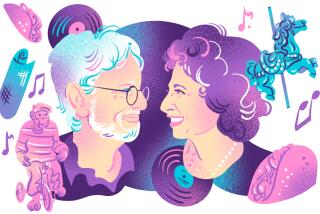When a Spouse Is Afflicted by Depression, the Marriage Can Suffer Too
- Share via
When insurance executive John Massolio Jr. experienced his first episode of manic depressive illness in 1979, an emergency room physician told his wife their marriage would probably not survive. John Massolio, now 65, had rejected the diagnosis. But after a severe episode in 1981, which began on an airplane trip and ended with his being escorted away from the plane in restraints, he could ignore it no more. He began seeing a psychiatrist, took his medication and enlisted Jane in the battle.
Twenty-five years later, the marriage has endured and Jane Massolio has acquired survival skills of her own. “The best thing I did was learn about the illness,” said Jane Massolio, who lives with her husband in Brandon, Fla., where the couple founded a branch of the National Depressive and Manic-Depressive Assn., an educational and support group based in Chicago.
She learned not to take his behavior personally. “I let him take responsibility for his illness,” she said. “But if you are not working on it together, there is no hope.”
Roughly 17 million Americans a year suffer from clinical depression, according to the National Institutes of Mental Health, but only half seek treatment. Clinical depression, which can include manic depressive illness, major depression and milder chronic depression, is marked by symptoms such as changes in sleep patterns, appetite, libido and a loss of interest in work, family and hobbies. Episodes can last six to nine months, and treatment is effective within a year in 80% of cases.
When depression strikes, it reaches beyond the depressed person, adversely affecting spouses, partners and children.
“Depression changes the way people interact,” said clinical psychologist Xavier Amador, co-author of “When Someone You Love Is Depressed: How to Help Your Loved One Without Losing Yourself” (Fireside, 1997). “There is more arguing and criticism.” According to one study, the divorce rate is nine times higher in couples in which a partner suffers from untreated clinical depression. Other research indicates that anyone living with a clinically depressed person is at higher risk of developing clinical depression themselves, said Amador.
Depression is a contagious emotion, said Century City psychiatrist Ronald Podell. First, the nondepressed partner tries to coax his or her mate into feeling better by being caring, supportive and empathetic. When that fails, the nondepressed person shifts to “coercive tactics,” said Podell, an assistant professor of psychiatry at UCLA. “There are threats, or there is constant arguing and blaming and the nondepressed person tries to manipulate the other into being better,” said Podell.
The depressed person feels worse, and the nondepressed person feels frustrated and angry. The nondepressed person becomes deeply preoccupied with the depressed partner’s emotions, theorizes Podell, and the two people “fuse” and grow co-dependent, locked in a negative, relationship-damaging dynamic.
In some cases, Podell said he recommends “therapeutic separation” so that couples can reestablish themselves as individuals.
There are, say experts, ways the nondepressed partner can be supportive without getting sucked into the negative spiral of a mate’s depression. The nondepressed partner should understand depression is an illness, treatable by a professional (not a spouse), said Brentwood clinical psychologist Mitch Golant.
The nondepressed partner can find equilibrium by joining a support group, by maintaining routines, interests, friends and by learning to listen with empathy and not react to volatile remarks (unless there are suicide threats), said Golant, co-author of “What to Do When Someone You Love Is Depressed” (Henry Holt, 1998). Abandonment is the depressed person’s greatest fear, said Golant, so a partner who is able to say, “I will not leave you” provides great solace.
Such practices have amounted to an emotional life raft for the Massolios.
“We had some very trying times,” said Jane Massolio. “We like to show people we are survivors. You just have to know you will get through it. I tell John all the time, ‘This is a disease that cycles. There are good times and bad times. We will get through it.’ ”






